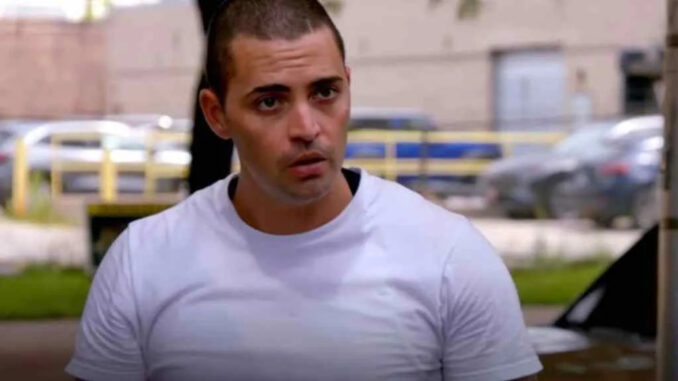
The Tides of Threads and Tweets: Dante Torres' New Look and the Fandom's Roar
In the meticulously crafted world of television, where every character choice, from a turn of phrase to a shade of lipstick, is a deliberate stroke on a larger canvas, even the subtlest alteration can send seismic tremors through an invested audience. For the loyal legions of Chicago P.D., the recent unveiling of Dante Torres with a visibly "new look" was not merely a cosmetic update; it was a narrative disruption, an aesthetic declaration, and a potent catalyst for a veritable digital tsunami of fan reaction. It underscored the peculiar intimacy viewers cultivate with fictional beings, transforming a simple haircut or beard growth into a high-stakes event, a barometer of a character's journey and the enduring power of fan collective consciousness.
Before this recent metamorphosis, Dante Torres, brought to life with quiet intensity by Benjamin Levy Aguilar, was an enigma cloaked in a familiar aesthetic. His look was one of understated grit: neatly trimmed hair, often slightly tousled but always practical, and a clean-shaven or subtly shadowed jawline that spoke of discipline and a man still finding his footing in a world far removed from his turbulent past. His attire—usually the somber hues of uniform or functional civilian wear—reinforced his image as a man of few words, his intensity communicated through his eyes and his unvarnished authenticity. This was the Torres fans knew: the reformed gang member striving for redemption, the quiet protector, the loyal protégé, his appearance mirroring his internal struggle and unwavering dedication. His established look was, in essence, a visual anchor to his character arc.
Then, the first promotional stills, the initial glimpses from a new episode, dropped like narrative bombs. The change, while perhaps minor in the grand scheme of network television, was undeniable and, for many, startling. Perhaps it was a subtly longer, more artfully disheveled hairstyle, or a more pronounced, sculpted beard that framed his jaw with newfound ruggedness. Whatever the precise elements, the collective gasp, followed by a cacophony of clicks and comments, was instantaneous. Screenshots proliferated like viral spores across Twitter, Instagram, and Reddit. Hashtags flared, polls were launched, and the immediate, visceral response was a testament to the profound connection fans held with this character.
The initial wave of reaction was, as expected, a joyous affirmation for many. "Torres Glow-Up!" screamed one tweet, accompanied by a string of heart-eye emojis. "He looks even hotter now, how is that possible?!" another fan exclaimed, capturing the sentiment of a large segment who celebrated the shift as an aesthetic awakening. For these viewers, the new look was a fresh, exciting evolution. It suggested confidence, maturity, perhaps even a quiet rebellion against the rigidity of his past or profession. It resonated with the desire for characters to grow, to shed old skin, and to surprise the audience. Benjamin Levy Aguilar's inherent charisma, amplified by the refined styling, garnered widespread praise, with fans crediting the actor’s ability to pull off any look while still embodying the character’s core.
Conversely, a vocal contingent met the change with a collective sigh of mild dismay, and in some cases, outright digital lament. "That's not MY Torres!" cried a fan, articulating the discomfort many felt with the unfamiliar. For these purists, the established look was sacrosanct, an integral part of his identity. The cleaner, sharper lines of his previous appearance symbolized his commitment to his new life, his fight against his darker impulses. The new look, for them, felt like a deviation, perhaps even a distraction. Was it a departure from the gritty realism of Chicago P.D.? Did it signify a character change they weren't ready for, or worse, one they didn't want? The fear that a physical alteration could signal a shift in personality, a loss of the very essence that drew them to Torres, was palpable.
Yet, beyond the superficial judgments of "hot" or "not my Torres," the deeper currents of the fandom's reaction spoke volumes about the nature of character, narrative, and audience investment. Was this new look a deliberate character choice, hinting at a storyline where Torres embraces a more individualistic path, perhaps less beholden to the expectations of the force? Was it a narrative breadcrumb, a subtle visual cue for an emotional shift yet to be explored? Or was it simply the actor's personal preference or a practical decision that coincided with the show's production schedule? For fans, every detail is a potential clue, a piece of a larger puzzle. The simple act of growing one's hair or beard becomes a symbol, a seismograph of fan sentiment, mirroring the deeper anxieties and excitements surrounding the character's future.
Ultimately, Dante Torres' new look, like a pebble dropped into a vast, interconnected digital ocean, created ripples that extended far beyond the screen. It showcased the peculiar and powerful bond between viewers and their beloved fictional beings, illustrating how even a seemingly minor alteration can ignite fervent debate, passionate defense, and speculative theorizing. In the hyper-engaged world of modern fandom, a character's aesthetic is never just about looks; it is a vital thread in the intricate tapestry of storytelling, a tangible reflection of the journey we share with them, and a reminder that even in the most grounded of police procedurals, the heart-eyes and critical tweets of the audience are as much a part of the narrative as any explosive chase scene.
